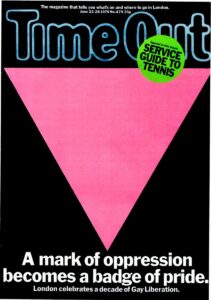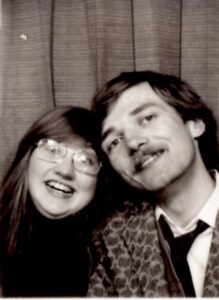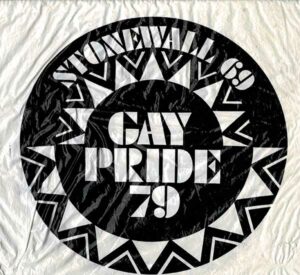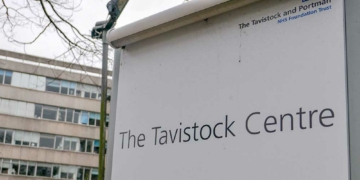Lesbian writer and performer Rose Collis had just received an Arts Council England National Lottery Project Grant to research and develop her new solo stage show, Forty Years Out (And Counting): Performing The Archive – and then lockdown happened. But Rose was not to be beaten – here’s her story.
It’s funny how much can your life change in a year…
In January 2020, I was delighted to receive an Arts Council England National Lottery Project Grant to research and develop my new solo stage show, Forty Years Out (And Counting): Performing The Archive, that would be, as I described it, ‘flagging up the lesbian history’, combining acapella songs, humour, archive materials and first-hand testimony.
The show, and associated public engagement events, would be based on my experiences of being an out and proud lesbian writer, performer and activist for over four decades and on my extensive archive dating back to 1978, featuring cuttings, photos, artefacts, ephemera, film footage and audio recordings.
It all began so well: the project officially began with three ‘taster’ events for the Outing the Past Festival 2020: at Higgins Bedford Museum Birmingham Museum and Art Gallery and Jubilee Library Brighton. The events consisted of a 20-minute ‘taster’ of what might be included in the show, comprising stories, images and acapella songs, followed by a Q&A. They were extremely well attended and enthusiastically received by audiences and organisers alike, and gave me clear indications and ideas on how to develop the show.
I began to go through my source material to identify areas/themes for inclusions, and text extracts from my own written work. One of these sources were my diaries dating from 1975 onwards. I had been dreading going back over them but, in fact, I found I could re-visit them with surprising objectivity and fascination.

And then, cometh Covid-19…
Since I know a number of people who work in local government and the NHS, I was receiving early information about how the situation was likely to pan out, and correctly anticipated that my programme of events was likely to be postponed for some considerable time. And so it transpired…
I received the following helpful guidelines from Arts Council England: ‘We will not be asking individuals or organisations to pay back awarded funding, if they have had to cancel or change plans due to Covid-19.’
‘Change plans’ was putting it mildly: I drew up, and then tore up, about eight different alternative plans as lockdown rules and guidelines came and went — and then came back again. I was allowed to re-purpose some of my funding to buy relevant equipment. So — for less than £500 in total — I bought a complete podcast/audio recording equipment kit; a Canon professional quality digital video camera kit; a digital projector, stand and tripod project screen, and downloaded the free Windows Movie Maker and VideoPad Editor video software, and Audacity professional audio recording software.
I immediately saw the potential of audio-visual digital pieces and originally envisaged doing a series of five-minute, ‘straight-to-PC-camera’ vlogs.
But then I realised just as quickly how boring that would be for audiences — and for me. I figured that people might want something a little more interesting to watch or listen to — and I certainly wanted to work on something more challenging. After that, it kind of took on a life of its own.

Going through my diaries over several months was a startling and overdue reminder of the importance of my five-year friendship with Neil, from our first meeting at school in 1975 and then during some of the most crucial post-school years of our lives. I was truly amazed at how much time we had spent together during those years and pleased to be poignantly reminded of how much we had meant to each other. I realised that our personal and political journeys — similar and contrasting — chronicled in the diaries were unique insights into a decade of enormous social and political change.
It was really exciting to teach myself how to use all the new equipment and software, especially as it presents me with new opportunities to take my work to global audiences. And — I did it all here from my desk at home in Seaford. What’s not to like?!
Of course, I had to create my own ‘trial and error’ processes and methods, and I kept a diary of it all, which I posted on my Facebook page.
January 25: ‘spent half the afternoon a) doing a test partial-narration recording and b) running image sequence again, taking timings for each section for matching narration text. Tomorrow, I will run through each section of narration and time it, to see if they approximately match each section of images…had a ‘dress’ rehearsal of the narration. It all works.
January 26: Decided to record the film’s narration this evening, when the risk of any external noise will be at a minimum. Did it in less than two hours. Safely saved and was able to make cuts and re-takes as I went. There’s just a couple of harmless tiny tongue-trips, to prove that I am indeed human.
January 31: And… that’s a wrap!
Added the narration track to the images.
Added the music track to the images.
Watched/listened to entire film for any duration discrepancies between sound and vision. Job’s a good ‘un!

I hope what I’ve done inspires other, older women artists to be confident about embracing digital equipment and technology to create their work, and tell more women’s stories. We are 51.9% of the population — the majority, treated like a minority, and our histories are so often overlooked, hidden or forgotten.
And I’m already planning my next film project — so watch this space!
The Boy and The Bear is available to view free on YouTube: https://youtu.be/g3pNXvMSlRM
























Comments
No comments yet, be the first to leave a comment.